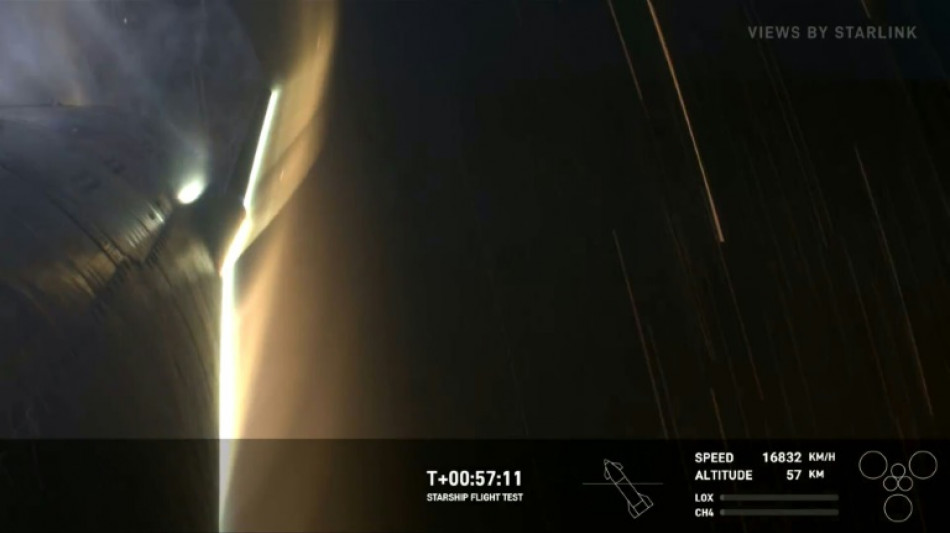
-
 Moscow revels in Trump's Greenland plans but keeps concerns quiet
Moscow revels in Trump's Greenland plans but keeps concerns quiet
-
Global tourism hit new record level in 2025: UN

-
 Senegal poised to party with parade honouring AFCON champs
Senegal poised to party with parade honouring AFCON champs
-
Osaka emerges for Melbourne opener under hat, veil and parasol

-
 Dogsled diplomacy in Greenland proves elusive for US
Dogsled diplomacy in Greenland proves elusive for US
-
Almost half of Kyiv without heat, power, after Russian attack

-
 EU vows 'unflinching' response to Trump's Greenland gambit
EU vows 'unflinching' response to Trump's Greenland gambit
-
Osaka steals show at Australian Open as Sinner strolls through

-
 Brignone impresses in first run of Kronplatz giant slalom in World Cup comeback
Brignone impresses in first run of Kronplatz giant slalom in World Cup comeback
-
Osaka emerges for Melbourne opener under white hat and umbrella

-
 Malawi suffers as US aid cuts cripple healthcare
Malawi suffers as US aid cuts cripple healthcare
-
Bessent says Europe dumping US debt over Greenland would 'defy logic'

-
 Freeze, please! China's winter swimmers take the plunge
Freeze, please! China's winter swimmers take the plunge
-
Talks between Damascus, Kurdish-led forces 'collapse': Kurdish official to AFP

-
 In-form Bencic makes light work of Boulter at Australian Open
In-form Bencic makes light work of Boulter at Australian Open
-
Spain mourns as train disaster toll rises to 41
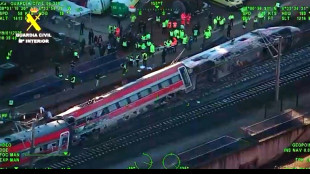
-
 Sinner into Melbourne round two as opponent retires hurt
Sinner into Melbourne round two as opponent retires hurt
-
Israel begins demolitions at UNRWA headquarters in east Jerusalem

-
 Almost half of Kyiv without heat, power, after Russian attack: govt
Almost half of Kyiv without heat, power, after Russian attack: govt
-
Veteran Monfils exits to standing ovation on Australian Open farewell

-
 Precision-serving former finalist Rybakina powers on in Melbourne
Precision-serving former finalist Rybakina powers on in Melbourne
-
South Korea's women footballers threaten boycott over conditions

-
 Equities sink, gold and silver hit records as Greenland fears mount
Equities sink, gold and silver hit records as Greenland fears mount
-
Australian lawmakers back stricter gun, hate crime laws

-
 EU wants to keep Chinese suppliers out of critical infrastructure
EU wants to keep Chinese suppliers out of critical infrastructure
-
AI reshaping the battle over the narrative of Maduro's US capture
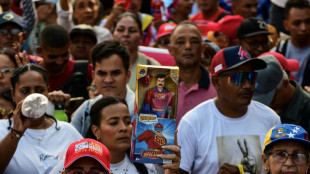
-
 Penguins bring forward breeding season as Antarctica warms: study
Penguins bring forward breeding season as Antarctica warms: study
-
Vietnam leader pledges graft fight as he eyes China-style powers

-
 Ukrainian makes soldier dad's 'dream come true' at Australian Open
Ukrainian makes soldier dad's 'dream come true' at Australian Open
-
'Timid' Keys makes shaky start to Australian Open title defence

-
 Indiana crowned college champions to complete fairytale season
Indiana crowned college champions to complete fairytale season
-
South Koreans go cuckoo for 'Dubai-style' cookies

-
 Harris leads Pistons past Celtics in thriller; Thunder bounce back
Harris leads Pistons past Celtics in thriller; Thunder bounce back
-
Tjen first Indonesian to win at Australian Open in 28 years

-
 Long-delayed decision due on Chinese mega-embassy in London
Long-delayed decision due on Chinese mega-embassy in London
-
Djokovic jokes that he wants slice of Alcaraz's winnings

-
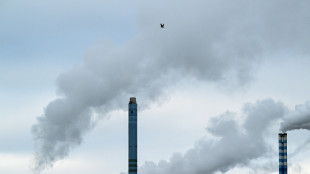 Trump tariff threat 'poison' for Germany's fragile recovery
Trump tariff threat 'poison' for Germany's fragile recovery
-
Tourists hit record in Japan, despite plunge from China

-
 Jittery Keys opens Melbourne defence as Sinner begins hat-trick quest
Jittery Keys opens Melbourne defence as Sinner begins hat-trick quest
-
The impact of Trump's foreign aid cuts, one year on

-
 Belgian court weighs trial for ex-diplomat over Lumumba killing
Belgian court weighs trial for ex-diplomat over Lumumba killing
-
Inside China's buzzing AI scene year after DeepSeek shock

-
 Asian markets sink, silver hits record as Greenland fears mount
Asian markets sink, silver hits record as Greenland fears mount
-
Shark bites surfer in Australian state's fourth attack in 48 hours

-
 North Korea's Kim sacks vice premier, rails against 'incompetence'
North Korea's Kim sacks vice premier, rails against 'incompetence'
-
Spain mourns as train crash toll rises to 40
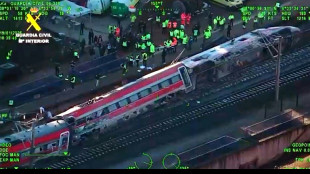
-
 'Very nervous' Keys makes shaky start to Australian Open title defence
'Very nervous' Keys makes shaky start to Australian Open title defence
-
Vietnam leader promises graft fight as he eyes China-style powers

-
 Dad-to-be Ruud ready to walk away from Australian Open
Dad-to-be Ruud ready to walk away from Australian Open
-
North Korea's Kim sacks senior official, slams 'incompetence'


In first, SpaceX's megarocket Starship nails ocean splashdown
SpaceX's massive Starship rocket achieved its first ever splashdown during a test flight Thursday, in a major milestone for the prototype system that may one day send humans to Mars.
Scraps of fiery debris came flying off the spaceship as it descended over the Indian Ocean northwest of Australia, dramatic video from an onboard camera showed, but it ultimately held together and survived atmospheric reentry.
"Despite loss of many tiles and a damaged flap, Starship made it all the way to a soft landing in the ocean!" SpaceX CEO Elon Musk wrote on X.
"Today was a great day for humanity's future as a spacefaring civilization!" he added.
The most powerful rocket ever built blasted off from the company's Starbase in Boca Chica, Texas, at 7:50 am (1250 GMT), before soaring to space and coasting halfway across the globe, for a journey that lasted around an hour and five minutes.
With its fully reusable design, Starship is essential to fulfilling Musk's ambitious vision of colonizing the Red Planet and making humankind an multiplanetary species.
NASA meanwhile has contracted a modified version to act as the final vehicle that will take astronauts down to the surface of the Moon under the Artemis program later this decade.
- Trial-and-error approach -
Three previous test flights had ended in Starship's destruction, all part of what the company says is an acceptable cost in its rapid trial-and-error approach to development.
"The payload for these flight tests is data," SpaceX said on X, a mantra repeated by the commentary team throughout the flight.
During the last test in March, the spaceship managed to fly for 49 minutes before it was lost as it careened into the atmosphere at around 27,000 kilometers per hour (nearly 17,000 mph).
Since then SpaceX made several software and hardware upgrades.
Around seven minutes after liftoff, the first stage booster, called Super Heavy, succeeded in an upright splashdown in the Gulf of Mexico, to massive applause from engineers at mission control in Hawthorne, California.
The cheers grew even louder in the flight's final minutes. Ground teams whooped and hollered as the upper stage glowed a fiery red, the result of a plasma field generated by the friction of the vehicle streaking through the atmosphere.
Space fans around the world watched in awe, thanks to a live broadcast powered by SpaceX's vast constellation of Starlink internet satellites.
A chunk of flying debris even cracked the camera lens, but in the end, Starship stuck the landing.
"Congratulations SpaceX on Starship's successful test flight this morning!" NASA chief Bill Nelson wrote on X. "We are another step closer to returning humanity to the Moon through #Artemis -- then looking onward to Mars."
- Twice as powerful as Apollo rocket -
Starship stands 397 feet (121 meters) tall with both stages combined -- 90 feet taller than the Statue of Liberty.
Its Super Heavy booster produces 16.7 million pounds (74.3 Meganewtons) of thrust, about twice as powerful as the Saturn V rockets used during the Apollo missions, and later versions should be more powerful still.
SpaceX's strategy of carrying out tests in the real world rather than in labs has paid off in the past.
Its Falcon 9 rockets have come to be workhorses for NASA and the commercial sector, its Dragon capsule sends astronauts and cargo to the International Space Station, and its Starlink internet satellite constellation now covers dozens of countries.
But the clock is ticking for SpaceX to be ready for NASA's planned return of astronauts to the Moon in 2026.
To do this, SpaceX will need to first place a primary Starship in orbit, then use multiple "Starship tankers" to fill it up with supercooled fuel for the onward journey -- a complex engineering feat that has never before been accomplished.
China is planning its own crewed lunar mission in 2030, and has a better track record than the United States as of late of adhering to its timelines.
C.Bruderer--VB



